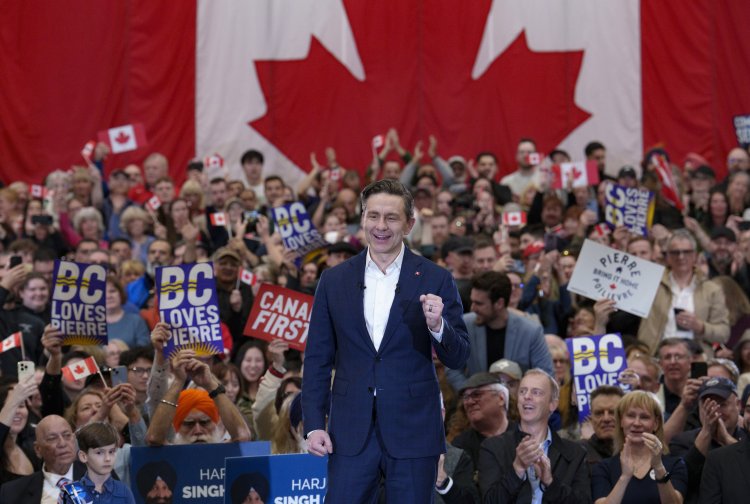Impact of Trump's Policies Leaves Canada's Conservatives Reeling
Conservative Leader Pierre Poilievre is facing challenges with his campaign as it grapples with the fallout from President Donald Trump's threats directed at Canada.

With just over three weeks remaining until Election Day, the Conservative Party is struggling in the polls and facing challenges in recruiting campaign volunteers in various districts—some candidates are even resorting to soliciting votes from friends and family.
“We really need you,” Lionel Loganathan, an MP candidate for a seat north of Toronto, urged his supporters. “Find your nephews, find your nieces, find your kids, send them to help us.”
Even incumbent MP Melissa Lantsman, a member of Poilievre’s inner circle, acknowledges the grim outlook. “This election is going to be won on the ground, and it's going to be close in a lot of places,” she remarked during a recent campaign appearance.
These sentiments echo a growing awareness among Conservatives that the party has seen a swift and unexpected shift in the final weeks of the campaign, despite having maintained a lead in the polls amid widespread dissatisfaction with the cost of living, high immigration levels, and the leadership of former Prime Minister Justin Trudeau.
The race has been significantly altered by President Donald Trump, who has energized Prime Minister Mark Carney’s campaign with the introduction of substantial tariffs and discussions of annexing Canada. As a result, Poilievre has found himself on the defensive.
At the same time, chaos is surfacing as Poilievre’s campaign struggles to regain its footing.
As voters deliberate over who is best suited to engage with the president, many perceive Poilievre’s Canada First message as too closely aligned with Trump’s America First agenda, and his straightforward slogans are alienating even some party supporters. His last-minute attempt to pivot appears to have only bolstered a rise in Liberal support in the polls.
Poilievre has brushed off in-party critiques regarding his sluggish response to Trump and Carney's narrative control.
“The struggles that Canadians are facing at home, the fear and the hurt that I hear everywhere across this land, those are real too, and I will not stop talking about these problems, which predate Donald Trump and which will outlast Donald Trump,” he stated in a speech to financial and business leaders.
He has also had to defend his campaign's tone. Acknowledging that his passion “can sometimes come out as hostility” during an interview with a local Toronto radio show, he committed to delivering a more “hopeful message" for the remainder of the campaign.
However, the challenges extend beyond his demeanor.
“Poilievre is a good leader, but a lot needs to be done from his side,” commented Dayo Jeje, a resident of Oshawa, Ontario, who had intended to vote Conservative after previously supporting the Liberals. “He needs to not just focus on saying the lyrics, I need to see more boots on the ground. And I need to see that driven from the top down.”
Jeje highlighted a bigger issue within the party, noting his two-week-old request for a Conservative lawn sign has gone unanswered.
The party needs to be “dispatching volunteers and signs ASAP,” he urged at a rally in his hometown.
Conservative party officials remain hopeful that grassroots initiatives can salvage the campaign, while casting doubt on the poll predictions.
“[People] ask me about the polls, and the polls don't make sense. And I'm not going to try to pretend I can understand them,” asserted Karen Stintz, a Conservative candidate in the Toronto area, to her supporters on Wednesday.
Costas Menegakis, a former MP running for the fifth time, also observes “a disconnect.”
“What I see in the polls is not what I hear at the doors,” he remarked.
The campaign is increasingly leveraging Poilievre’s rallies as a countermeasure to their declining poll numbers, which currently suggest that the Liberals will be granted a fourth mandate.
Attendance at Poilievre’s rallies has surged, a novel occurrence in Canadian elections that the candidate takes pride in highlighting. However, others find the atmosphere reminiscent of American politics, especially as concerns about an economic and cultural takeover by the U.S. president loom large.
Campaign staff are anxious when attendees brandish flags that say “Fuck Carney,” quickly trying to collect MAGA hats and other Trump merchandise to avoid them appearing in news coverage.
To mitigate risks, the campaign is meticulously controlled; Poilievre is striving to distance himself from Trump’s populism after having previously embraced some of those ideas. This is the first election where the media isn't permitted to travel with the leader, and campaigns have been advised against initiating media discussions. Poilievre's team selectively chooses which reporters can ask him questions, with staff trailing national journalists at his rallies to prevent interactions with attendees. In at least one instance, a journalist faced physical interference from campaign staff.
A disconnect persists between Poilievre's online persona and the realities faced by local candidates. Incumbent Larry Brock, who represents a Conservative stronghold now feeling the impact of Trump’s tariffs, states he’s engaged in a hard fight for his seat and is unsure of whether voters will send him back to Ottawa.
Earlier this week, ten candidates in the Toronto area set up a booth in a vacant warehouse, earnestly appealing for volunteers and distributing promotional items like hockey pucks and tote bags.
There is also an organized effort to encourage early voting, aimed at ensuring voters don’t change their minds on Election Day or risk non-participation on April 28.
Supporter Patrick Beresford believes that Poilievre could do more to engage younger voters, potentially through mediums like podcasts.
Ultimately, Beresford emphasizes that this election is less about persuading Liberal voters to choose Conservative, and more about mobilizing Conservative supporters to vote.
“Young people, university-aged people. People that are Conservative, but they’re not going to vote because they don’t think about it, or they don’t know how,” he explained. “It’s about getting those people.”
Rohan Mehta for TROIB News












